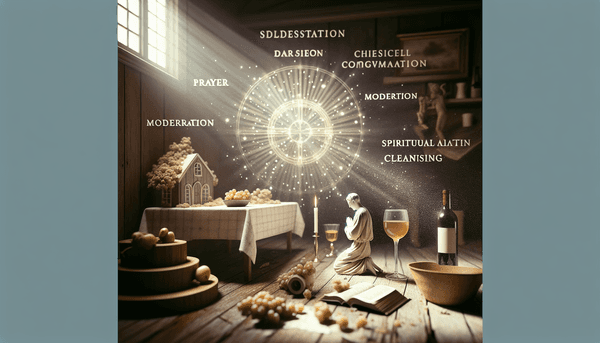Establishing a Relationship with God
The foundation of a relationship with God begins with belief in His existence and an acceptance of Jesus Christ as one's savior. This pivotal step involves an intimate act of faith—confessing one's sins, turning away from them in repentance, and inviting Jesus into one's heart with the trust that 'if you declare with your mouth, \"Jesus is Lord,\" and believe in your heart that God raised him from the dead, you will be saved' (Romans 10:9). As the seed of faith takes root, it must be nurtured through daily practices such as prayer, reflection on the Scriptures, like how the psalmist describes the word of God as 'a lamp for my feet, a light on my path' (Psalm 119:105), and actively living out the love and kindness that Jesus exemplified. Engaging with a community of believers provides a scaffold for spiritual growth, as the Bible encourages us not to give up meeting together but to encourage one another (Hebrews 10:25).
Biblical Perspectives on Wisdom and Counsel
The Bible places great emphasis on the pursuit of wisdom and the importance of seeking counsel. Proverbs 12:15 tells us, 'The way of fools seems right to them, but the wise listen to advice.' This principle extends beyond personal wisdom to encompass the collective wisdom found within a supportive community. The Bible implies that there is strength in numbers and success in the multitude of counselors (Proverbs 15:22). In a similar vein, exploring the richness of the Christian tradition can provide additional insight into the role of guidance in our lives. In today's context, this could be akin to the modern practice of therapy, where seeking help is viewed as a sign of strength, a way to 'carry each other’s burdens' (Galatians 6:2), and an opportunity for both spiritual and psychological healing. By integrating the timeless wisdom of the scriptures with contemporary understanding, individuals can navigate life's challenges with greater clarity and purpose.
The Role of Music and Media in Spiritual Life
The influence of music and media on our spiritual well-being is significant. As Christians, we are encouraged to fill our lives with that which is noble, right, and pure, contemplating 'whatever is true...whatever is lovely, whatever is admirable—if anything is praiseworthy—think about such things' (Philippians 4:8). Music, as a form of media, can either uplift the spirit or lead it astray. Ephesians 5:19 urges believers to speak to one another with psalms, hymns, and songs from the Spirit, making music from the heart to the Lord. The choices we make in what we listen to and watch should be intentional, aligning with our values and serving to edify our faith. As we navigate the vast waters of entertainment, we should constantly assess whether our consumption glorifies God (1 Corinthians 10:31) and fosters a closer relationship with Him.
Conclusion
Embarking on a spiritual journey is a deeply personal endeavor, yet it is one that is beautifully guided by the wisdom of the scriptures. Through the stories, teachings, and parables of the Bible, believers find a roadmap for developing a relationship with God, understanding human nature, seeking wisdom, and integrating faith into every aspect of life. As we reflect on these themes, we are reminded that faith is not static; it is a living, breathing part of who we are, shaping our actions, thoughts, and interactions with the world around us. May this exploration of spiritual connection serve as an invitation to delve deeper into the richness of faith, and may it encourage us to weave the divine more intricately into the fabric of our daily lives.
FAQ
Q: How can I develop a relationship with God in my daily life?
A: You can develop a relationship with God daily by setting aside time for prayer, studying the Bible, living out Jesus' teachings of love and kindness, and participating in a church community.
Q: What role did Judah play in the biblical narrative?
A: Judah played a significant role in the biblical narrative, including selling his brother Joseph into slavery and committing a sin with his daughter-in-law Tamar. Despite his flaws, he demonstrated repentance and ultimately became an ancestor of Jesus Christ.
Q: What does the Bible say about seeking wisdom and counsel?
A: The Bible emphasizes the importance of seeking wisdom and counsel. Proverbs 12:15 and 15:22, for example, highlight the value of listening to advice and having many advisers for successful planning.
Q: What does the Bible say about the importance of thanksgiving?
A: The Bible encourages thanksgiving as an essential aspect of worship. Psalm 100:4, for instance, tells us to 'Enter his gates with thanksgiving and his courts with praise; give thanks to him and praise his name.'






